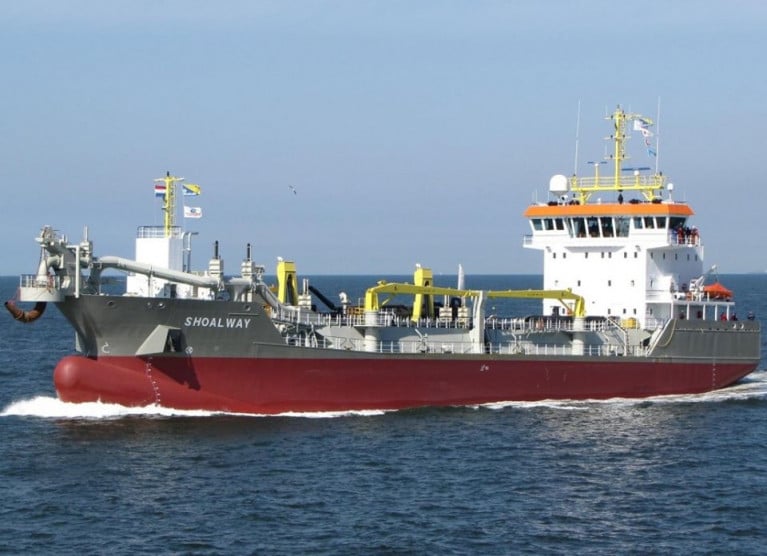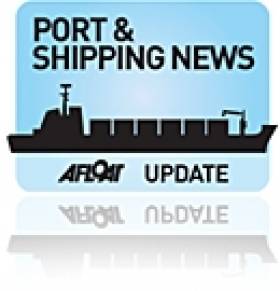Displaying items by tag: Belview Port
Full Steam Ahead at Port of Waterford’s Belview Terminal As Rail Engine Makes Swap-Over
At the south-east Irish port of Waterford, the main terminal at Belview is where two trains were at the facility that led to maximised efficiency as an engine swap-over took place, writes Jehan Ashmore.
The swap-over was carried out last month at the Belview Port terminal located in Co. Kilkenny, which is downriver of Waterford City. According to the Port, there was a rails train to load out railtrack and then shortly afterwards, the liner service from Ballina, Co. Mayo had arrived with containers to be exported to mainland Europe on the Samskip/DFD Logistics service.
The engine for the first train laden with railtrack, swapped over and connected up with the container train to pull it out. Such an operation is unique, as the Port of Waterford is the only port in Ireland which can conduct this logistical procedure at the rail connected terminal.
With Belview Port having this capability, the terminal is at the forefront of the rail freight sector since the 1990’s, operating up to 30 trains per week using 4 rail sidings. Now with renewed investment in the rail sector, the terminal which also last month had dredging carried out by Freeway (update due) has proven its capability to meet the needs of the sector intregrated with maritime transport.
The train which transported the containers were offloaded and then loaded onto the 803 TEU lo-lo capacity containership, Samskip Express operated by Samskip on behalf of the joint service with DFDS Logistics. The short-sea feeder containership is part of the overall Belfast, Dublin, Waterford, Cork liner services to mainland Europe.
Samskip Express is run on biofuel and was today tracked by Afloat to the Dutch port of Rotterdam, noting in 2021, Amsterdam was added to service operations linking Ireland.
Dredging Operations Underway at the Port of Waterford
A maintenance dredging campaign has begun in recent days at the Port of Waterford where activities will involve the waters of Duncannon Bar, Cheekpoint, and at the port's main terminal at Belview, writes Jehan Ashmore
Prior to the operations at the south-east port, the Cypriot flagged Shoalway, a trailing suction hopper dredger had been carrying out operations for the Dublin Port Company. Shoalway sailed from the capital to arrive on the Waterford Estuary on Sunday.
According to the Port of Waterford (click to consult campaign notice here), the dredger will dispose spoil at an approved site south west of Hook Head, Co. Wexford. Dredging will be followed by a bed levelling campaign by the vessels, Fastnet Sound and or the Glenesk.
Afloat adds that Irish Dredging which is a subsidiary of Royal Boskalis Westminster nv, the world’s largest dredging group, was given the contract from the Port of Waterford. The extensive fleet of the Dutch group provides Irish Dredging access to the use a of wide range of vessels for projects around the Irish coast.
Further tracking of the Shoalway since introduction on the Waterford Estaury has seen the 90m long dredger kept busy between Cheekpoint to the spoiling grounds out to sea.
The campaign according to the Port of Waterford is expected to last approximately 24 days.
#SeaRailFreight- A new container rail-freight service between Waterford Port and Ballina began operating this week, to link in with DFDS Logistics sailing schedules to and from Europe.
The container trains are running to a twice weekly service in each direction linking the Belview Port terminal downriver of Waterford City and the northern Co. Mayo town.
According to Irish Rail (Iarnród Éireann), the new service will benefit customers in the west and north-west of Ireland in particular, providing them with a cost effective alternative when compared with a road based shipping. Coupled with this, the customer also reduces their carbon footprint.
The trains are scheduled to meet DFDS lo-lo vessels sailing from Belview Port to Rotterdam, which allows for onward delivery into Europe. Customers can now load in the west of Ireland on Tuesday morning and deliver in The Netherlands on Thursday pm/Friday am.
Rotterdam also provides access to DFDS sailings to Norway, and rail connections to Italy, allowing for a rail-sea-rail connection from Ballina to Milan.
DFDS will utilise a significant amount of available rail-wagons, but have left scope to develop the service further by introducing new customers, both internal Irish traffic and import / export traffic.
This is an important addition to the DFDS services in Ireland, and as a customer for Irish Rail's freight division. The new service is covering a longer distance, guaranteed volumes and direct port access.
The introduction of the service will see freight volumes increase from 91m tonne kilometres in 2012 to 105 m tonne kilometres approximately in 2013.

























































